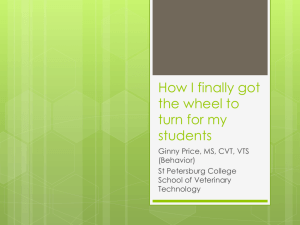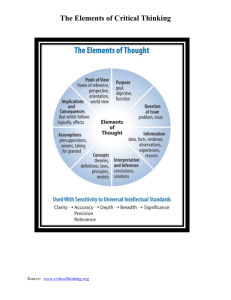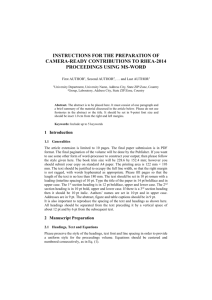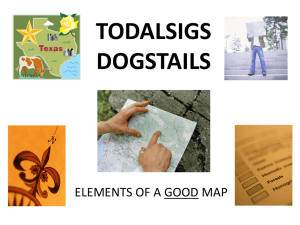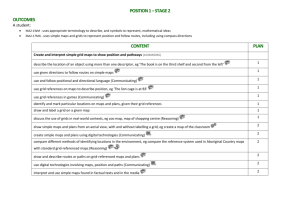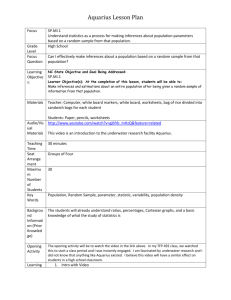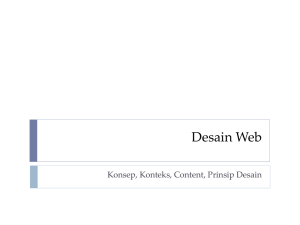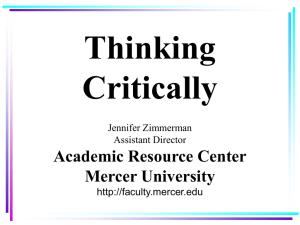Critical thinking Active Learning
advertisement
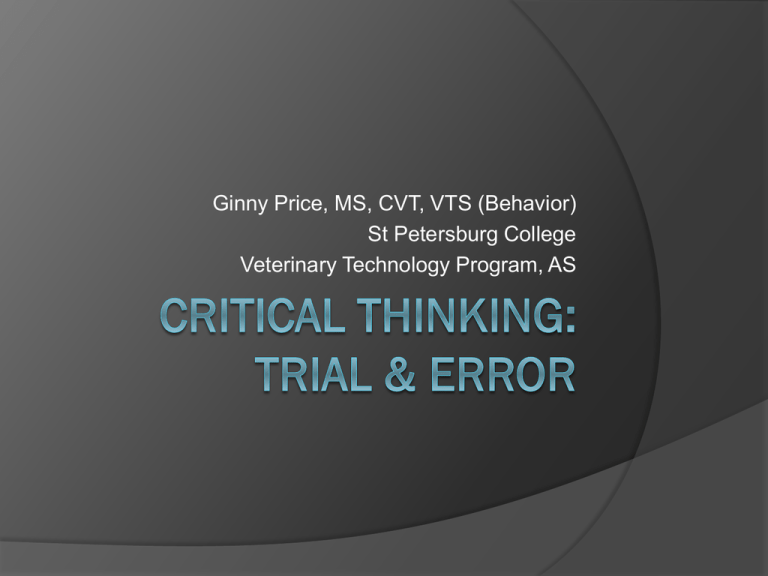
Ginny Price, MS, CVT, VTS (Behavior) St Petersburg College Veterinary Technology Program, AS Measure first First day of class measured critical thinking using ARC & a scenario I wrote Different ways of presenting measurement: On Angel ○ Quiz ○ Discussion post ○ Drop box In class ○ Hand written paper Intervention Teach critical thinking in the course What I’m doing in behavior Added a critical thinking component to discussion topic assignment: online & in class Students use it to create weekly written assignments On campus students discuss all four topics within a small group; online students can read posts written on all topics Students critique another student’s written work with the same grid Critical thinking grid: 8 elements Purpose: Does the student write a clear purpose statement explaining what they may gain from learning the information contained in this topic? Key Items in Topic: Does the student clearly include all the items asked for in this topic? Do they accurately identify the core issues and appreciate their depth and breadth? Modified from: Foundation for Critical Thinking Critical thinking grid: 8 elements Point of View: Does the student identify the points of view of people and animals discussed in the post? Do they identify their own point of view? Information: Does the student use information from assigned reading sources and are they properly cited in text and at the end of their work? Modified from Foundation for Critical Thinking Critical thinking grid: 8 elements Concepts: Does the student use examples from their personal experience that enhance understanding of the concepts included in the topic; concepts may include such things as types of learning, types of behavior modification, or other broad categories of ideas (tameness & domestication). Assumptions: Does the student accurately identify their own assumptions (things taken for granted) related to this topic? Does the student make assumptions that are consistent, reasonable, & valid? Does the student identify other's (animal's or client's) assumptions? Modified from Foundation for Critical Thinking Critical thinking grid: 8 elements Inferences: Does the student make cause and effect statements? For example, because I overslept I am late to work. Does the student make deep (rather than superficial) inferences? Are the inferences consistent? Inferences should be specific. Clinical Application: Does the student write a statement explaining how they could apply what they learned from this topic in hospital with their patients? Modified from Foundation for Critical Thinking Topic example: Topic 2 Discuss how tameness and domestication differ. How do these principles affect an animal's fear? Describe a fearful patient of yours. Student example A richer understanding of topics… Learning information Students learn facts by: Reading about them to use the information in their written work Integrating information from the reading in their written work & citing it Spending more time thinking about information Thinking more deeply about information by using critical thinking Using personal experience examples to link new information to known information Learning to think Students learn to think better by: Listening carefully Thinking about their own & other’s thinking Supporting their ideas with citations from their texts & other scientific sources Supporting their ideas with their experiences Thinking across disciplines Working together Writing well Measure again Measured students critical thinking again using ARC & a scenario I wrote A unique scenario Compare measurements Measurements from Fall.2010 On campus students Fall 2010 386 400 350 278 300 250 200 150 100 50 0 pretest average post test average Measurements from Fall.2010 Online Students Fall 2010 400 350 316 298 300 250 200 150 100 50 0 pretest average post test average Changes… In Spring Removed exams from course Measure learning using critical thinking discussions & clicker training project In Summer Changed instructions to make critical thinking discussion assignment clear Added scaffolding to critical thinking discussion All posts require: Issue Post (1 @ 10 points): Due Friday, incorporate all 8 elements of reasoning from the Critical Thinking Grid Response Post (1 @ 10 points): Due Sunday, critique classmate’s post incorporating comments on all 8 elements of reasoning from the Critical Thinking Grid, comments should include an example of how student fulfilled requirement or a suggestion on how they could. Scaffolding the lesson lesson one, two, three, four & five lesson six, seven & eight lesson nine, ten & eleven use 8 elements of reasoning as headings list responses as short sentences or bullets use 8 elements of reasoning as headings use complete sentences with sources as responses write responses as an essay using the 8 elements of reasoning as headings New Topic Two Purpose: What might you gain from learning about this topic? Key Items: Discuss how tameness and domestication differ. How do these principles affect an animal's fear? Describe a fearful patient of yours. New Topic Two Point of view: What are the points of view of animals and people discussed in your post? Information: What information from the assigned reading was relevant to this topic? What other scientific source could add to the topic? New Topic Two Concept example: What personal experience could you share on this topic? How does it relate to the concepts in this topic? Assumption: What do you take for granted on this topic? Have they changed since you learned this information? New Topic Two Inference: What cause & effect statements can you include to elaborate on this topic? Clinical Application: How could you apply what you learned from this topic as a veterinary technician? Faculty gains…why make the effort? Students can apply what they learn making instructor/program more productive. Student products are improved & more interesting. Authentic learning measurements are used. Satisfaction seeing real gains in student learning. Resources www.criticalthinking.org http://www.spcollege.edu/criticalthinking/ resources/games.htm http://criticalthinkinginst.wetpaint.com/ http://www.iime.org/documents/elo.htm http://www.etsu.edu/criticalthinking/defa ult.asp Questions?
